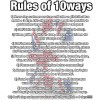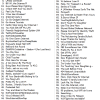Waiting to hear something after a job interview is excruciating, especially if you really want the role. When you’re keen on a certain job, it’s natural that you’d want to get an offer. So, when you get that all-important call and it’s a… ‘no’, it can really hurt. Here are some of the most likely reasons you didn’t get the job.
1. Your CV and LinkedIn profile don’t match
 Picture: https://giphy.com/gifs/tv-land-younger-youngertv-l2R098V90nJfuHKg0
Picture: https://giphy.com/gifs/tv-land-younger-youngertv-l2R098V90nJfuHKg0
This is a rookie error and one that many people out there make every time that they apply for a role. The truth of the matter is that it’s all-too easy to keep your LinkedIn profile up to date. Each time you get a new role, experience, or qualification, you can just add it to your profile at the click of a button. It’s just that easy.
But wait, what about your CV? One of the major mistakes that people make when it comes to this is thinking that their LinkedIn speaks for itself. While that may be true to some extent, these two things really need to match. What if a potential employer looks at your CV and then your LinkedIn and the two are different? They will either think you’ve lied on one of the profiles or that you’re a lazy person. Neither of these things will work in your favour. Trust us!
If you want to make sure that you get the best possible shot at a job, keep these two things in sync. They should be a mirror image of one another. When you update one, make a habit of doing the exact same thing to the other.
2. You failed to do proper interview prep
 Picture: https://giphy.com/gifs/4Fh0B2CCaickE
Picture: https://giphy.com/gifs/4Fh0B2CCaickE
We know, we know… Interview prep is utterly boring. Sitting around with your partner or friend going over the same old questions is…well… dull. But here’s the thing: It’s also essential. Interviewers will try to put you on the spot and take you out of your comfort zone. Practising at home may sound like a waste of time but it will mean that you’re ready for whatever they choose to throw at you.
Of course, you should always go over the basic questions, but make time to look at some niche ones too. When it comes to your career, there are sure to be specific questions that relate only to you. So, you need to have answers for these too. It’s worth making a list of all the things that you think an interviewer may ask you and coming up with answers for each of them.
Read: Most Asked Job Interview Questions
3. You used the same example more than once
You know that moment when the interviewer asks you to ‘Give an example of a time when…’? Yeah, that’s a key question. This is them wanting to figure out what your experience and what you’ve done before now. This is not a question that you can just fob off with a bland or even generic answer. Nope, you have to be 100% specific. Think about this as story time and you’re the narrator.
Make sure that you have a few different examples of your workplace conquests. For example, you should have a story that shows how you can adapt to new situations as well as one that shows how you overcome conflict in the workplace.
The likelihood is that you can only get a mark for each example used. So… if you use the same example for two different questions, you won’t get two marks. Eek. Having a variety of answers is the best way forward.
4. Your phone went off during the interview!
Here’s one that most people think is basically ‘no big deal’ but it seriously can be. If you forget to turn your phone off or, indeed, to silent, you’re playing with fire. Should it go off, your interviewer will remember. We know it sounds kind of petty, but this will be a big black mark on your interview overall.
The fact of the matter is that everyone has mobile phones in the modern world. Using them 24/7 for just about everything we need to do is second nature to most of us. Still, in an interview, all of your attention should be on the interviewer. Failing to turn your phone off tells them that you’re too laid back to care about the interview process. While that may not at all be the case, it’s not a message you want to accidentally send out.
Read: How to NOT suck at your interview
5. You badmouthed your ex employer
 Picture: https://giphy.com/gifs/workaholics-comedy-central-season-3-episode-13-l0ErKy7mntQkg3YWs
Picture: https://giphy.com/gifs/workaholics-comedy-central-season-3-episode-13-l0ErKy7mntQkg3YWs
There’s no doubt about it. Your interviewer will ask you about your previous employer. That in itself is very normal and it’s something that you should, of course, expect. Still, if you start badmouthing your ex employer, you will have some serious trouble with the interview as a whole. You might think that the interviewer will appreciate your brutal honesty. Trust us, they won’t.
When you say negative things about your previous employer, it tells an interviewer a couple of things about your personality. The first is that you have no sense of loyalty. This person gave you a job and an opportunity, and here you are tattling on how awful they were. It also shows the interviewer that you are a ‘negative’ person, i.e. one who will never be satisfied with their workplace.
As you might imagine, neither of the above personality traits are what an interviewer wants from you. If they get a sniff of you being unloyal or negative, they won’t want to hire you. Remember, these people are looking for the creme de la creme of candidates.
6. You were seriously nervous and it showed
Picture: https://giphy.com/gifs/jack-tripper-G4Ihli2UThrBS
If you’re fairly new to the whole interviewing malarkey, it’s natural that you might get a tad nervous before the big day. This honestly happens to the best of us so don’t worry too much. Keeping your nerves under control is essential if you want to woo the interviewer. IF they get a hint that you’re out of your comfort zone, it will not work in your favour. The reason is simple; they want confident people in their workplace. Duh!
Of course, much of the time, calming your nerves is easy said than done. Preparing well for the exam is certain to make you feel a little more chilled out about the whole thing. You may also want to use some breathing exercises as well to help relax your body and mind. Plus, you can also take some herbal remedies, such as St. John’s Wort or Kalms. These things will help you to unwind when you need it the most.
Buy: St. John’s Wort or Kalms
7. Your body language was all wrong
 Picture: https://giphy.com/gifs/community-troy-barnes-donald-glover-9EuG8bg3yzhzq
Picture: https://giphy.com/gifs/community-troy-barnes-donald-glover-9EuG8bg3yzhzq
This may come as a shock… Your body language says way more than you ever could. Most people never consider what they are saying to people with the way that they sit and hold themselves. You want to appear as confident as possible (without being cocky!) at your interview. As we’ve already mentioned, no one wants to hire someone who is, frankly, a bag of nerves. It’s just not ideal.
So, what should you do? Well, you need to make sure that you hold your body in a confident and, importantly, open way. You need to essentially ‘command the space’ so that the interviewer sees you as a viable candidate for the job. There are endless techniques and methods that you may wish to use. Reading up on them ahead of time could make all the difference.
Buy: Body Language for Dummies
8. You haven’t updated your skills
When was the last time you updated your skills? We don’t just mean on your CV. We mean IRL. The working world changes all the time, and so staying ahead of the game when it comes to working skills is essential. Of course, many people avoid training and the like because it’s expensive. It doesn’t have to be. There are places online where you can gain access to free sessions and even qualifications.
If you’re struggling to gain a role at the moment, it may well be worth taking the time to get some skills that will help you along the way. Sure, this will take some extra dedication and time on your part but it may well be worth it in the end.
Check out: Free Online Courses
9. Or, worse, you lied about your skills
 Picture: https://giphy.com/gifs/college-elf-food-12NlCFUvTokWXe
Picture: https://giphy.com/gifs/college-elf-food-12NlCFUvTokWXe
If there’s one thing worse than not having the right skills it has to be lying and saying that you do. You might think that answering ‘yes’ to everything is the way forward, but it’s not. Sure, it might get you through the first stages of the interview, but you will soon get found out. For example, when the interviewer asks you to backup your claim that you can fly a plane, you will fall short (unless you’re a real life pilot). If you don’t have the skills in question, don’t pretend you do. It’s that simple.
10. You just weren’t the right fit
 Picture: https://giphy.com/gifs/bkKvvzE9PEcTK
Picture: https://giphy.com/gifs/bkKvvzE9PEcTK
Finally, here’s the cold, hard truth. Sometimes, you just won’t be the right fit for a particular role. It happens. It’s not nice, but it happens. Aiming high is always a great idea, but you need to accept that you’re not going to get offered every single job you apply for. It’s, sadly, not how life works.
Still, you need to use setbacks to your advantage. The next time you get a big fat ‘no’, ask yourself why you didn’t get the job. You can likely learn from the experience in more ways than one. Whether you need to sharpen your skills or just get more experience, there will be many ways you can improve from here. Good luck.


 Picture:
Picture: 
























